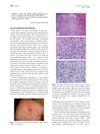 120 citations,
October 2004 in “International journal of radiation oncology, biology, physics”
120 citations,
October 2004 in “International journal of radiation oncology, biology, physics” Higher doses of cranial irradiation are linked to permanent hair loss.
 May 2024 in “Microbial Biosystems Journal”
May 2024 in “Microbial Biosystems Journal” Herbal shampoos are as effective and safer than synthetic antifungal shampoos for treating Seborrheic dermatitis.
 1 citations,
May 2017 in “InTech eBooks”
1 citations,
May 2017 in “InTech eBooks” Some cosmetic procedures show promise for treating hair loss, but more research is needed to confirm their safety and effectiveness.
 25 citations,
November 2008 in “Facial Plastic Surgery”
25 citations,
November 2008 in “Facial Plastic Surgery” Dr. Michael Beehner recommends a personalized, careful approach to hairline design in hair replacement surgery for a natural look.
 7 citations,
December 2021 in “Pharmaceutics”
7 citations,
December 2021 in “Pharmaceutics” Natural products like plant extracts can help promote hair growth and could be used to treat hair loss.
 40 citations,
February 2012 in “Dermatology Online Journal”
40 citations,
February 2012 in “Dermatology Online Journal” Lasers might help hair growth in some alopecia cases, but more research is needed to confirm their effectiveness and safety.
 41 citations,
September 2007 in “Pediatric emergency care”
41 citations,
September 2007 in “Pediatric emergency care” Oral medication is necessary to treat scalp fungus in children, with griseofulvin being the usual choice.
 163 citations,
April 1953 in “Acta radiologica”
163 citations,
April 1953 in “Acta radiologica” Radiation therapy with a higher dose for the brain improves survival in cerebellar medulloblastoma.
 275 citations,
March 1999 in “Journal of The American Academy of Dermatology”
275 citations,
March 1999 in “Journal of The American Academy of Dermatology” Chemotherapy can cause various skin reactions, with hair loss being the most common, and proper diagnosis and treatment of these reactions are important.
 18 citations,
December 1996 in “Seminars in Cutaneous Medicine and Surgery”
18 citations,
December 1996 in “Seminars in Cutaneous Medicine and Surgery” Chemotherapy and cytokine therapy can cause various skin reactions, including hair loss and hypersensitivity.
 52 citations,
November 2013 in “European Journal of Pharmaceutical Sciences”
52 citations,
November 2013 in “European Journal of Pharmaceutical Sciences” Chitosan-decorated polymersomes improve finasteride delivery for hair loss treatment.
 February 2023 in “Vlaams dierengeneeskundig tijdschrift”
February 2023 in “Vlaams dierengeneeskundig tijdschrift” Two young cats with a severe ear and skin condition improved with immune system-targeting treatments.
 January 2023 in “International Journal of Indian Medicine”
January 2023 in “International Journal of Indian Medicine” Ayurveda offers holistic treatments for hair fall, including therapies and lifestyle changes.
 51 citations,
October 2002 in “British Journal of Dermatology”
51 citations,
October 2002 in “British Journal of Dermatology” Finasteride increases hair density in female androgenetic alopecia, but individual results may vary.
 3 citations,
May 2011 in “Journal of the American Academy of Dermatology”
3 citations,
May 2011 in “Journal of the American Academy of Dermatology” A woman's excessive hair growth around a leg ulcer was linked to a treatment with Prostaglandin E1 ointment.
 5 citations,
June 2012 in “Journal of Cosmetic and Laser Therapy”
5 citations,
June 2012 in “Journal of Cosmetic and Laser Therapy” Finasteride and intense pulsed light effectively reduce unwanted facial hair in women, but may not be cost-effective.
 2 citations,
March 2005 in “Cancer biology & therapy”
2 citations,
March 2005 in “Cancer biology & therapy” Bexxar treatment led to a high response rate in patients with advanced-stage, treatment-resistant follicular lymphoma.
 September 2023 in “Pharmaceuticals”
September 2023 in “Pharmaceuticals” Tiny particles improved delivery of hair loss treatments to hair follicles, with lipid-based particles performing best.
 6 citations,
February 2010 in “Journal of The American Academy of Dermatology”
6 citations,
February 2010 in “Journal of The American Academy of Dermatology” A woman had a rare skin condition with recurring painful nodules that heal in 6 weeks, often without needing treatment.
 60 citations,
January 1989 in “Toxicologic Pathology”
60 citations,
January 1989 in “Toxicologic Pathology” Using minoxidil on dogs can cause serious cardiovascular damage, including arterial injury and hemorrhagic lesions.
2 citations,
June 2020 in “Journal of Investigative Dermatology” 3D imaging of skin biopsies offers better accuracy but is time-consuming and can't clear melanin.
 25 citations,
October 2012 in “Dermatologic clinics”
25 citations,
October 2012 in “Dermatologic clinics” Laser and light treatments can effectively remove hair long-term.
 21 citations,
January 2013 in “Annals of dermatology/Annals of Dermatology”
21 citations,
January 2013 in “Annals of dermatology/Annals of Dermatology” The combination of cyclosporine and PUVA might help treat severe alopecia areata.
 183 citations,
March 1982 in “JAMA”
183 citations,
March 1982 in “JAMA” Spironolactone is a safe and effective treatment for reducing excessive hair growth in women.
 4 citations,
August 2020 in “Journal of Cosmetic Dermatology”
4 citations,
August 2020 in “Journal of Cosmetic Dermatology” QR 678 and QR678 Neo treatments are effective for hair loss in women with PCOS.
 8 citations,
June 2019 in “Pharmaceutical research”
8 citations,
June 2019 in “Pharmaceutical research” Applying heat with certain chemicals can greatly improve how well isotretinoin gets into the skin through hair follicles.
 January 2024 in “Archives of dermatological research”
January 2024 in “Archives of dermatological research” Both treatments for alopecia areata showed similar modest effectiveness.
 1 citations,
January 2023 in “Przegląd Dermatologiczny”
1 citations,
January 2023 in “Przegląd Dermatologiczny” A man's severe skin reaction from cancer treatment improved with early diagnosis and proper medication.
20 citations,
November 2017 in “JAAD case reports” Ustekinumab significantly improved psoriasis, vitiligo, and alopecia areata in a patient.
 13 citations,
October 2012 in “InTech eBooks”
13 citations,
October 2012 in “InTech eBooks” Nanocarriers could improve how drugs are delivered through the skin but require more research to overcome challenges and ensure safety.




























